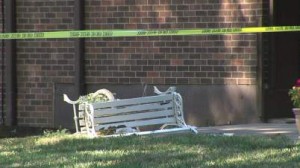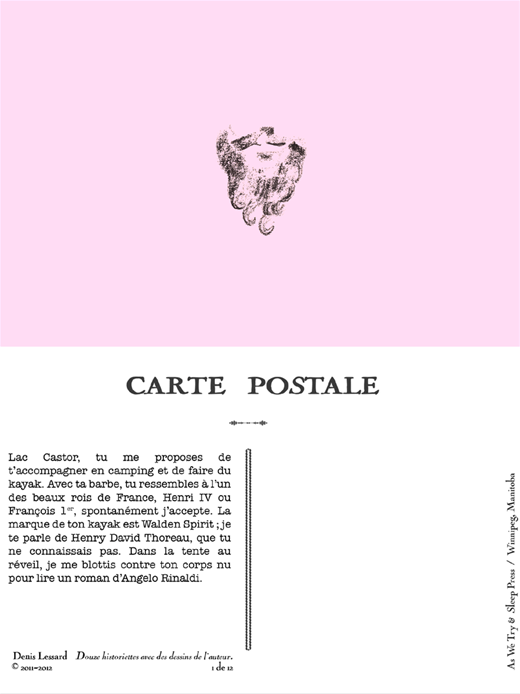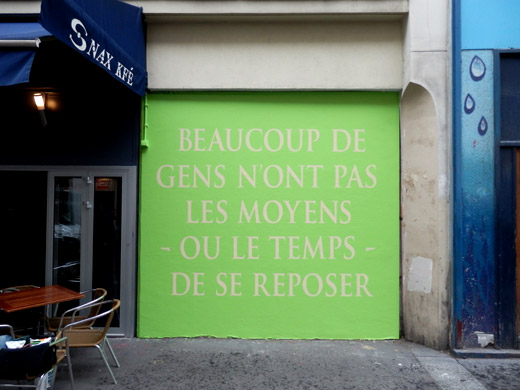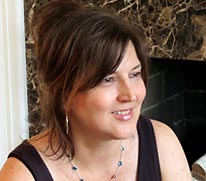Excerpt from Oscar of Between, Part 17B
by
Betsy Warland
“During the six years of my architectural education the subject of comfort was mentioned only once.”
— Witold Rybczynski, Home: A Short History of an Idea
Denis and Oscar first “met” via staying in one another’s apartments in the spring of 2009. Oscar, desperate for a writing retreat but unable to afford one, had been asking everyone she knew in Vancouver if they knew anyone in Montreal interested in an apartment exchange. At the eleventh hour, Oscar ran into Allyson on The Drive. They’d not seen one another for a few years and Oscar suggested they go for lunch and catch up. In their conversation, Oscar asked the Montreal exchange question and, remarkably, Allyson thought her friend Denis might be interested. And, he was.
Upon arriving at Denis’ Oscar notes that, regardless of the dissimilar architecture (–space –) and eras in which their buildings were constructed (– time–) Denis and Oscar’s sensibilities (– relationship –) to creating home are similar. Oscar puzzles over which man is Denis in the photos throughout his apartment yet she feels immediately at home. Within days, Oscar writes two of her best pieces: the final essay for Breathing the Page, “Sustaining Yourself as a Writer,” and Part 12 of Oscar of Between.
Two years later, Oscar asked Denis if he would like to read Part 12 of Oscar of Between as it evoked a number of details about his apartment. Yes, he wanted to read it. She sent it. Several days later, Denis emails Oscar.
I have read your Montreal manuscript just once, with great interest. Yes, the brassiere lady … Rest assured: I never hang any underwear on the clothesline either …
I could also tell you more about the grey cat if you wish …
Iris of eye in her teal pajamas, Oscar awakens early each morn in Denis’ white bedroom and white-sheeted bed. Gazes out tall window on her right. Watches how ivy on brick cups sunlight like an enchanted child’s hands, its leaves move ever so slightly in a moisture-infused breeze after last night’s storm. Oscar listens for the sound of the opening bars of Denis’ neighbors’ rising: pop of a balcony door opened; cupboard doors and drawers – flat & tableware jostled; clink-clink-clink of a spoon in cereal bowl; crescendo of kettle whistle then sharp chirp as it’s lifted off burner; murmur of first exchange of words; recorder’s lilt briefly played; staccato complaint of laundry line pulled after each item’s pegging.
Difference between vertically entering the day and horizontally entering
it – how Oscar cherishes it.
Arc of memory leaps to just over a year ago – the phone call – one of Oscar’s students had died. Counseling had been arranged, Oscar had told her student she’d go to the next immigration lawyer appointment with her, pleaded with her, “Don’t give up. Write about it – they can’t take that away from you – don’t give them that power.” But the vortex was unrelenting. For days after the phone call, Oscar feels it in her body – the how – before police confirm it. Her student had jumped. Jumped from her eight floor balcony. No turning back.

Photo Credit: FOX4 Kansas City
Where space + time = relationship collapse.
Those weeks before, her student kept saying, “There’s nothing anyone can do.”
“Nobody can do anything.”
Utterly alienated as an exile for twenty-five years in a European country, her brother executed in Iran, Canada was her only hope.
Her student had been embraced as a writer but it wasn’t enough. It was nowhere near enough.
This is where we resort to a two-letter word: I can’t take it anymore. I didn’t see it coming. It will come back to haunt you. It’s over.
Side of Montreal brick building – 3′ x 5′ rectangle of grey paint obliterates graffiti. Post-cover-up, two words spray-painted on top of solid grey:

Guest Artist:
Denis Lessard
Montreal, QC
www.denislessard.ca
“Until the eighteenth century, the idea of having comfort at home was so unfamiliar that no word existed for the condition. Comfortable meant merely ‘capable of being consoled’.”
— Bill Bryson, At Home: A Short History of Private Life
Allyson had sent a message: one friend was looking for an apartment exchange in Montreal. At first I replied that I would keep my ears open and let her know if I heard of anything, but then I thought better of it and told myself: “Why don’t I go?” And this is how Oscar came to my place to write, and how I got to stay at Oscar’s in Vancouver.

One postcard from a set of 12.
Drawing and text by Denis Lessard.
Design by Larry Glawson.
Published by As We Try & Sleep Press, Winnipeg.
“As writers …, we are endlessly having to set and reset parameters for protecting our concentrated writing time with our intimates and others around us, as well as with ourselves, and even with our writer-friends.”
— B. W.
Jean et Claude vont rendre visite à Marcel Carbotte et Gabrielle Roy au Château Saint-Louis. Après le repas, Gabrielle Roy se lève et dit : « Maintenant, je vous prie de m’excuser, je dois aller travailler… » Elle se retire dans la pièce voisine et laisse les trois hommes ensemble, refermant les portes françaises. Je l’imagine assise en train d’écrire à son petit pupitre d’écolière, dans la grande pièce nue.
How I met Steven
Just when I was planning to call Olivia at the tea store in Vancouver, I received an e-mail from her, announcing the arrival of new teas. I called the store and Olivia answered, but right away the voice was different, deeper. I addressed myself to Olivia but the voice replied: “In fact, this is not Olivia …” Jokingly, I said: “You must be the fake Olivia …” I introduced myself, still under the impression that I was speaking to a lady. I could feel a smile in the voice. I asked the person to please tell Olivia that I would drop by on Monday afternoon.
That Monday at the store, a very kind Asian man came up to me and introduced himself: “My name is Hoi-sin,” he said humourously, “just like the sauce. In fact I am Betsy’s brother’s partner, Steven, who will come and meet me here in a while.”
This is what had happened: when I first called Olivia, she saw the name Warland on the call display, and handed the phone right away to Hoi-sin, thinking it was Steven. Then Hoi-sin was smiling on the phone, believing that it was a certain Danny who was playing a trick on him by disguising his voice with a French accent.
And this is how I ended up having tea with Hoi-sin and Steven at Olivia’s, whose tea store had been highly recommended to me by Oscar.
Betsy writes a note in my guest book, telling me that she has finished writing Oscar of Between. Here.
Denis Lessard

180 rue Saint-Martin, Paris,
June–August 2012.
Photographer: Laurent Marissal

Featured Reader:
Andrea Mozarowski
Toronto, ON
I read Oscar’s Salon because…
it is a rich river delta.
A play of the particulate.
A crucible.
Oscar’s Salon is a process that asks us to pay attention, to show humility in the face of ignorance, to burrow with our hearts, to fall into dark places, and to trust the energy of emergence.
Profile
Andrea Mozarowski is an educator and writer living in Toronto. The manuscript she is writing is a post-war story that probes, in the words of Professor Kate Brown, “the ragged, fraying edges and silences left behind by the people who were unlucky enough to be born in one of the most quietly violent territories of the 20th century.” Surviving revolution, terror, famine, and war, three generations of Ukrainians search, over the course of their lives, to believe in love again.
Betsy Warland, from whose mentorship Andrea has benefited enormously, describes Andrea as a kind of war correspondent piecing together fractured narratives of the living and the dead.
Picture Andrea sitting beside a pile of bones. Her ancestors’ bones. She is trying to get close to them for their heat—for life force, for old knowledge, for love.
Fire in the bones.
In the end or the beginning we cannot undo what has happened. We can only tell it.




I keep playing with the idea of space-time-relationship represented here in layers. How two people are experiencing space, an assumed space and place. I am reminded of our relationship with place, especially when the space is borrowed. (A timed experience of space.)
How we stop seeing our environment when we are too comfortable. How we learn the nuances of a new space: the grey cat, the brassiere lady, the tea shop. How we try to find comfort in someone else’s space, find the signs of the familiar. The grey cat, the brassiere lady, the local tea shop all are recognizable. They become familiar.
I’m also reminded of what sustains us as writers: a time out for writing, giving time to ourselves. Allowing ourselves to forget time. Then, the fruits of the experience found in Denis’ guest book. Also, what about serendipitous timing? A phone call, seeing Warland on the call display leads to a meeting. How we are connected to those who normally occupy a borrowed space.
Then, there is the shock of a traumatic recollection. How the present collapses with memories, intertwined. Then again, memories are what becomes of our experience of space, time and relationships. But when the piece focuses in on the details of space and place, the “clink-clink-clink of a spoon in a cereal bowl,” the memory resonates as if in an empty room.
Comfort – I love the idea of Architecture having little concern for user comfort. Juxtaposed to strangers finding ‘home’ in each other’s dwellings perhaps users need to inhabit to establish human comfort zones. Should it be the role of Architecture to provide safety as a bottom line? How some people can merrily hang out oversized bra’s above the street level and others cannot see the space for living within the architecture of their lives.
These two pieces swing like laundry and morning-establishing routine to ground themselves in tea time, serendipitous camaraderie and a sense of life drifting on.
I am left a bit melancholy and adrift in a semisweet way.
relationships across space/time physical/cyber continue:
As I wait on Easter Sunday for a phone call from Cheryl Sourkes through whom I met Betsy last year in Toronto, I’m reading this installment of Oscar written in Denis’ apartment in Montreal, Denis whom I met through Rae Davis, a good friend of mine who died 5 years ago, whom I last saw after Rae’s death in a French Brasserie in Montreal when I was there for a screening of my films and about whom I’ve wondered from time to time “what’s he up to these days?’ And as I read 17B, Gaston Bachelard’s “The Poetics of Space” came to mind – a book that struck me forcefully when I came upon it in the late 70’s in the stacks of Mt. Allison U. in Sackville, N.B. and which has stayed in my memory reduced to a notion of “inhabiting” and something about a “hut”. I will now go back to my bookshelves and look through that book again – now.
ps. Betsy if you want an exchange again in Toronto, let me know! – You too Denis – B.
a knocked over bench, the drop from eight stories. this part of oscar is, on first read, a stone, heavy, a story from which i long to turn away. it begets my own eighth floor, one i must continually and consciously decorate as an architecture of staying. i want to go toward the cliche of death as rest. i other her narrative. this struggle to stay present, to be present for the all the necessary conversations. “beaucoup de gens n’ont pas les moyens ou les temps de se reposer” -denis
Home. The question. Who decides what and where home is? Decides who can have it? Who cannot? The quarrel. How our need for home is manipulated into a pretext for all forms of greed and aggression. The Ukraine. Urban renewal. Unwanted refugees. In Oscar’s Salon, Oscar finds refuge (home) in how each voice seeks a space of mutual homage.